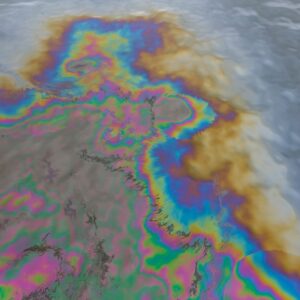 We all have a stake in clean, healthy waterways and it is heartbreaking to see an oily sheen on the water. Oil and fuel contain harmful chemicals that can compromise water quality and affect our aquatic environment even in small quantities.
We all have a stake in clean, healthy waterways and it is heartbreaking to see an oily sheen on the water. Oil and fuel contain harmful chemicals that can compromise water quality and affect our aquatic environment even in small quantities.
As a boater, you can use caution during fueling and practice preventative engine maintenance that will help prevent spills in the water.
- Regularly inspect lines and hoses for deterioration, and fix small leaks
- Replace oil pan gaskets and oil seals whenever the motor is removed for maintenance to reduce leakage
- If you change your own oil, use a closed system – a portable vacuum oil change pump that drains into a closed container to prevent spills during transfer of oil to a hazardous waste facility
- Carry oil absorption pads to sop up any drips while fueling your boat or filling a portable tank
What should you do if you see a spill?
- Identify and stop the source of the spill if it is safe to do so
- Notify the marina for assistance
The Canadian Coast Guard operates the Canadian Coast Guard Environmental Response (CCG ER). Its mission is to ensure an appropriate level of preparedness and response for all ship-source and mystery-source pollution incidents in waters under Canadian jurisdiction. There is a CCG ER detachment in Parry Sound that handles all commercial shipping spills, along with spills from pleasure craft. Between 40 and 50 percent of its responses are for pleasure craft spills.
Under the Marine Liability Act, the vessel owner responsible for a spill must report the incident and will be responsible for the costs associated with spill cleanup. Cleanup, if practical, is either conducted by CCG ER or contracted out. Spills could result from bilge discharge, gas dock fueling mishaps, sinking or a vessel fire – just to name a few possible causes.

The appropriate agency to respond to a spill is determined by the source of the spill. There are numerous potential spill materials and the methods for containment and mitigation are different. Safety must always be the primary concern.
Note that gasoline spills are especially dangerous. The Coast Guard advises to remove people and sources of ignition. Gasoline has a flash point as low as -40 to -50oC. That means that even on the coldest winter day enough gasoline will evaporate to potentially cause a fire or explosion hazard. The hazard potential depends on many factors, including how big the spill is and how quickly it can disperse depending on currents, winds and the weather. If it is an enclosed area, even small amounts of fuel could be considered an explosion risk. Gasoline spills must not be contained. Call the Coast Guard and 911 if there are safety concerns.
Note that once fuel hits the water it will tend to spread, its movement influenced by current and wind. Slicks will move with 100% of the current speed but only 3% of the wind speed. It should be noted also that most marinas and fire departments have minimal spill response equipment.
No Soap!!
Remember that the addition of detergents or dish liquids to waterways is strictly prohibited. Detergents are toxic to aquatic life and do not clean up spills. They move fuel from the surface down into the water column and impact even more aquatic organisms.
Finally, check to see if your boat insurance covers environmental cleanup as not all policies do. If it doesn’t, call your broker and update your policy.
For more information, see:
- Responding to Small Fuel Spills from Vessels in Marinas – Fisheries and Oceans Canada
- Appearance and Thickness of Oil on Water – Canadian Coast Guard
